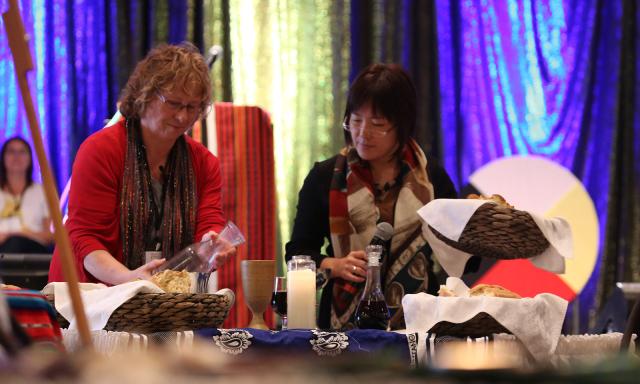When we affirm and welcome a variety of expressions of faith, it deepens our understanding of God and of each other.

God exists in community, and we are invited to be in community together.
Individually and in community, we do everything through the lenses of our cultures: there is no such thing as a culture-free perspective. Our experiences and understandings are shaped by our cultures. Since we cannot capture the complexity of God through our limited cultural understandings, our understanding of God is limited when we see this God through only one dominant cultural perspective. Instead, our understandings of God and our scriptures can be deepened when we come together, as disciples of Jesus Christ, in all of our differences and diversities to acknowledge intercultural reality and richness.
We strive to become an intercultural church to deepen our understandings and experiences of God and of one another. Within the United Church, a variety of cultural expressions of faith are affirmed and welcomed. Part of the vision of the intercultural church is to create a space where we can sustain our own cultural identities while also affirming those of one another.
An intercultural church is a welcoming church…
- It is joyful, accepting, and life-giving.
- It trusts that God’s Spirit opens us to new experiences. It recognizes that those experiences can be challenging, painful, or uncomfortable.
- In referring to God, it uses a range of names and images. In writing policies and making statements, it uses many different images and ways of speaking.
- It is committed to listening and learning, not just to speaking and teaching. It invites full participation and dialogue. It allows itself to be changed.
a relational church…
- It treasures the different contexts that God gives to different communities. It values diverse expressions of faith.
- It offers a positive vision of the whole community, together in its diversity. It encourages a healthy critique of each other’s points of view.
- It values the give and take of respectful relationships. It commits to building right relationship with all of creation.
- It takes steps to become a multilingual community.
an adaptive church…
- It is able, with God’s grace, to accept mistakes. It learns from the past and grows.
- It is open to being vulnerable.
- It affirms diverse cultural identities, and avoids their assimilation into the dominant culture.
- It dares to engage in an ongoing transformation of heart, mind, structure, and policy. It adapts to change when change is called for.
a justice-seeking church…
- It keeps finding new ways to share resources, redress imbalances of power, and challenge unfair systems. It seeks the equitable participation of all—both inside and outside of the church.
- It faithfully addresses racism and White privilege.
- It recognizes the churches’ participation in historic injustices. It strives to do things differently.
- It thinks globally and commits itself to seeking justice.
an intentional church…
- It aims to be enriched by different experiences and points of view. It knows that we hold much in common, but also have many differences.
- It provides a safe context for difficult conversations.
- It supports and encourages diverse leadership. This is especially important in communities that have been marginalized in the past.
- It examines itself, reflects, and keeps learning. It prays, educates, and consults. It monitors how well it is living out its intercultural vision.
a missional church
- It looks for and applies the biblical and theological foundations for becoming an intercultural church.
- It affirms that the God of mission has a church in the world. We—in all of our differences—are active participants in God’s mission.
What does “intercultural” mean?
It means living together with a respectful awareness of each other’s differences. We do this by examining ourselves, building relationships, and distributing power fairly.
This is a plain language revision of the “Vision for Becoming an Intercultural Church,” which was adopted at the Executive of General Council (GCE) in October 2012 as part of the report “Intercultural Ministries: Living into Transformation.”
Downloads
- Vision for Becoming an Intercultural Church (105.87 KB) (PDF)